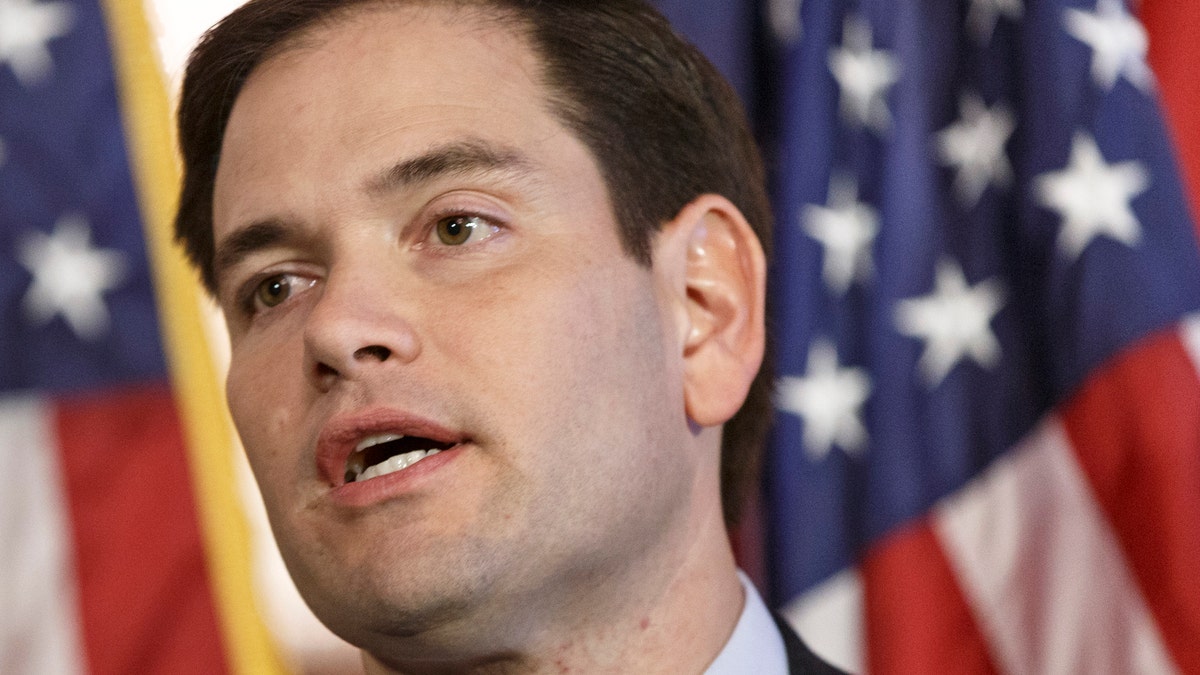
FILE - In this Jan. 8, 2014 file photo, Sen. Marco Rubio, R-Fla. speaks on Capitol Hill in Washington. This is a year of auditioning, positioning, networking and just plain hard work for people who are considering running for president in 2016. You could see them stirring in 2013 as they plugged holes in resumes, took preliminary steps to build potential campaign organizations and made carefully calibrated moves to get better known by Americans generally and key constituencies in particular. Most _ but not all _ are ticking off items on what could be called the presidential prep checklist. And theyâve got baggage to deal with. (AP Photo/J. Scott Applewhite, File)
Sen. Marco Rubio, a major player on immigration policy, said Wednesday that there was no chance now of passing a broad overhaul because Republicans have lost trust in President Barack Obama.
The first-term Florida lawmaker, a potential White House contender in 2016, cited GOP concerns about whether the president could be trusted to enforce tough security requirements in the Senate's bipartisan immigration bill that Rubio helped write.
Rubio said the Obama administration has lost credibility as a result of how it handled the 2012 attack against a U.S. outpost in Libya and accusations that the Internal Revenue Service targeted conservative groups.
Rubio said doubts about Obama and his team colored his conversations with lawmakers he had hoped to persuade to back the immigration overhaul, now stalled in the House.
"The central impediment to making progress on this issue was people would say to me, 'We understand that you put all this security stuff in the bill, but we don't think it matters and we just don't think government will enforce the law anyway,'" Rubio told reporters at a breakfast organized by The Wall Street Journal.
"'You can write whatever you want in that bill. But the federal government will not enforce the law.' As a result, they will just do the legalization part but they won't do the enforcement part."
Rubio expressed his doubts as House Republican leaders were in the midst of reviving efforts to overhaul the immigration system with new broad policy principles. But they are facing a direct challenge from a GOP senator who is warning against a headlong rush toward reform.
Alabama Sen. Jeff Sessions, the top Republican on the Senate Budget Committee, delivered a 30-page package to all 232 House Republicans on Wednesday that offers a point-by-point rebuttal to the expected standards that House Speaker John Boehner and other leaders plan to circulate this week among GOP members at their annual retreat.
Sessions warned of the negative impact of proposed changes to immigration policy on U.S. workers, taxpayers and the rule of law as the House leaders look at legalization for some of the 11 million immigrants living here illegally. Sessions and other opponents argue that legal status and work authorization still amounts to amnesty.
The GOP starting point is a statement of principles that is expected to focus on border and interior security, legalization with the requirement that immigrants pay fines and back taxes, and ensuring that Obama enforces any law, according to lawmakers, congressional aides and outside advocates, speaking on condition of anonymity because they weren't authorized to publicly discuss the principles being drafted.
Republican leaders plan to circulate the principles on Thursday at the GOP caucus' retreat in Cambridge, Md.
For his part, Rubio said Republicans told him they feared a repeat of President Ronald Reagan's immigration overhaul that gave about 3 million immigrants legal immigration status without following through with corresponding security improvements.
Rubio said other lawmakers brought up controversies that have dogged the administration and been favorite lines of criticism among conservatives. They includes the rocky rollout of the new health law and the disclosures about surveillance programs conducted by the National Security Agency.
"They pointed to the IRS scandal and the Benghazi stuff and then the NSA revelations and then the 'Obamacare' decisions by this administration as evidence of how the government and this administration unilaterally decides which portions of the law to enforce and which ones not to enforce. And that further undermines," Rubio said.
Conservatives have said Obama used the IRS to go after political enemies' tax-exempt statuses. IRS workers in a Cincinnati office singled out conservative political groups, such as tea party affiliates, in the spring of 2010 and continued to do so until 2012.
IRS supervisors in Washington oversaw the targeting but there has been no evidence released so far that anyone outside the IRS knew about the targeting or directed it.
As for Benghazi, four Americans, including U.S. Ambassador Chris Stevens, were killed during the attack on the U.S. diplomatic mission on Sept. 11, 2012.
The circumstances of the attack and the administration's response remain a politically charged subject ahead of the 2014 elections, as well as the 2016 presidential election.
Hillary Rodham Clinton, who was secretary of state at the time of the attack, is a possible Democratic presidential contender in 2016.
The administration also has faced scrutiny from members of both parties over NSA spy programs disclosed when former agency contractor Edward Snowden leaked a trove of documents in June.
Finally, the administration has given reprieves to parts of his national health care law, which is sometimes called "Obamacare." That has led to accusations the administration is willing to ignore the law to curry favor with allies.
Taken together, these issues have sown doubt among lawmakers that Obama could be trusted to enforce strict immigration provisions in the Senate-passed legislation, Rubio said.
As for the House Republican effort to move forward on immigration, Rubio said: "The goal now is to reach a result. And reaching a result requires us to be realistic."
Based on reporting by The Associated Press.
Follow us on twitter.com/foxnewslatino
Like us at facebook.com/foxnewslatino




